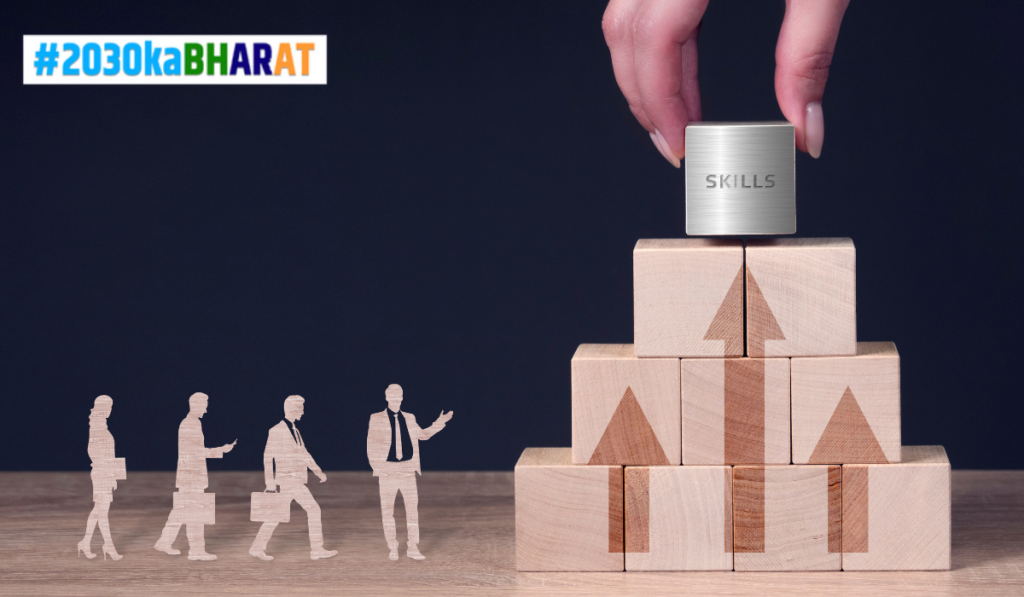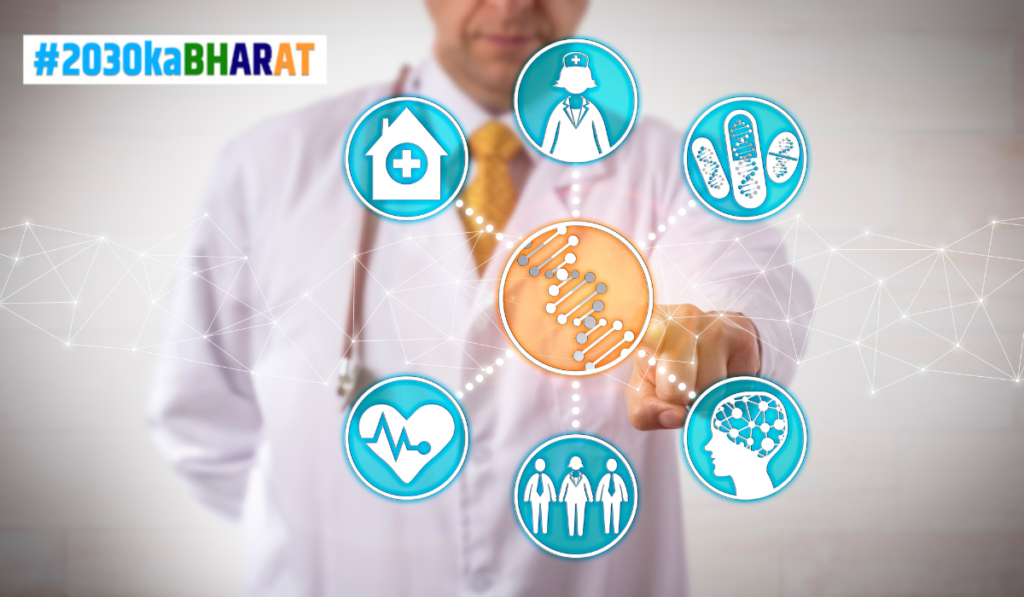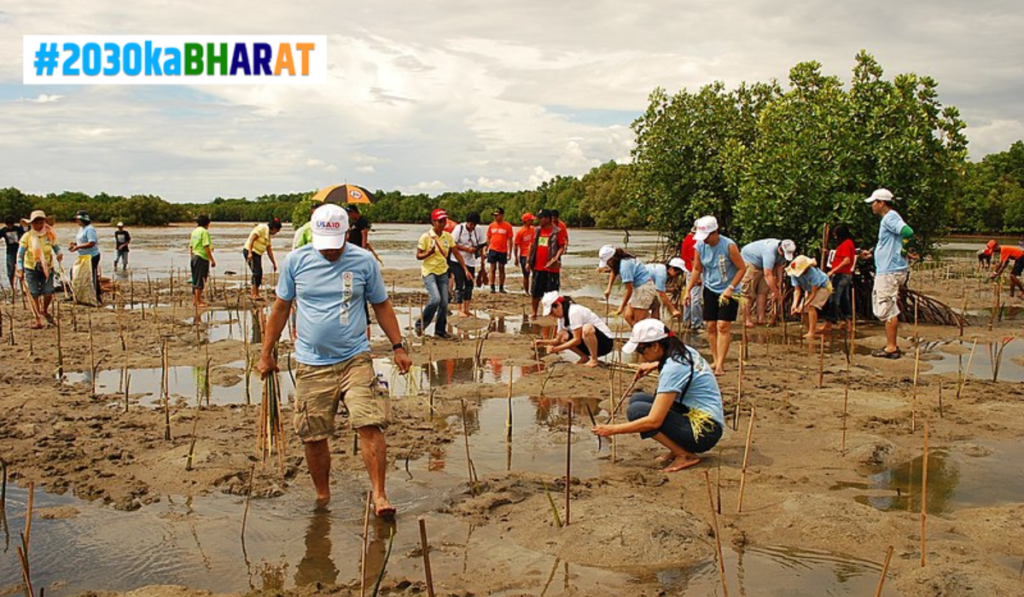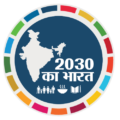The Sustainable Development Goals (SDGs) stand as a global roadmap towards a more equitable, sustainable, and prosperous future. For India, the pursuit of these goals is not merely a commitment but a transformative vision encapsulated in “2030KaBharat” – a comprehensive strategy to propel the nation towards sustainable development. As we delve into the dynamics of SDG Goals, it becomes imperative to assess India’s current standing, acknowledge achievements, confront challenges, and articulate a forward-looking vision.
Current Status of SDGs in India
India, a nation of vast diversity and potential, has made commendable progress in its pursuit of the SDGs. According to the SDG India Index 2022, the country has witnessed an overall improvement in its composite score, indicating positive strides in multiple areas. While the nation has successfully addressed certain goals, significant challenges persist, demanding a nuanced understanding of the current landscape.
Assessment of India’s Progress
In the realm of poverty alleviation, India has made substantial progress, with millions lifted out of extreme poverty in recent years. The Pradhan Mantri Jan Dhan Yojana (PMJDY) has played a pivotal role in promoting financial inclusion, empowering marginalized communities.
However, challenges loom large, especially concerning the urban-rural divide and regional disparities. Despite strides, a sizable population remains vulnerable to poverty, necessitating targeted interventions and inclusive policies.
Education and Skill Development
Education stands at the core of sustainable development, and India’s efforts to enhance educational outcomes have been noteworthy. The implementation of the Right to Education Act has increased school enrollment, emphasizing inclusivity.
Yet, challenges persist in ensuring quality education and aligning curricula with the evolving demands of the job market. Skill development initiatives need to be more agile, equipping the workforce with the skills required for a rapidly changing global economy.

Gender Equality and Empowerment
Gender equality remains a critical focus area for India. The Beti Bachao, Beti Padhao (Save the Daughter, Educate the Daughter) initiative reflects the nation’s commitment to empowering women. The increasing participation of women in various sectors is a positive sign, but deeply rooted societal norms and gender-based violence remain impediments.
Clean Energy and Environmental Sustainability
India’s commitment to renewable energy sources is evident in its ambitious targets for solar and wind energy. The Ujwal DISCOM Assurance Yojana (UDAY) has been instrumental in improving the financial health of distribution companies, facilitating a more sustainable energy landscape.
Nevertheless, environmental challenges persist, from air pollution in urban centers to water scarcity in certain regions. A holistic approach is crucial to mitigate the impact of climate change and ensure the sustainable use of natural resources.
Healthcare and Well-being
The COVID-19 pandemic underscored the importance of a robust healthcare system. India’s vaccination drive showcased the nation’s resilience in the face of a global health crisis. The Ayushman Bharat initiative, aimed at providing financial protection and improving healthcare delivery, has been a significant step.
However, the need for strengthening healthcare infrastructure and addressing disparities in access to healthcare services is evident. Rural areas, in particular, face challenges in healthcare accessibility and quality.
Vision for a Thriving India by 2030
As India strides towards 2030, the “2030KaBharat” vision encapsulates a holistic approach to sustainable development. This vision extends beyond mere economic growth, emphasizing the integration of social, economic, and environmental dimensions. Aligning national policies and strategies with the SDGs is imperative for achieving this transformative vision.
Aligning National Policies
The success of “2030KaBharat” hinges on the seamless integration of SDGs into national policies. The National Institution for Transforming India (NITI Aayog) plays a pivotal role in coordinating efforts across ministries and states to ensure a unified approach. The recently launched SDG India Dashboard serves as a dynamic platform, providing real-time data and insights to monitor progress.
To enhance policy coherence, it is crucial to establish a robust framework that incorporates the principles of sustainable development into decision-making processes. This includes promoting inclusive and participatory policy formulation, fostering collaboration between government agencies, and engaging with diverse stakeholders.
Integrating Sustainability into Sectors
Sustainable development necessitates a paradigm shift in how various sectors operate. In the economic sphere, promoting green businesses and fostering innovation can drive inclusive growth. The adoption of circular economy principles can minimize resource depletion and environmental degradation, ensuring a more sustainable future.
In the social realm, addressing issues of inequality and promoting social cohesion are integral components of the vision. Investments in education, healthcare, and social protection programs are imperative for building resilient and inclusive communities.
The environmental sector demands a transition to cleaner and renewable energy sources, coupled with stringent measures to conserve biodiversity and natural resources. Sustainable urban planning and waste management practices are crucial for creating ecologically responsible and livable cities.

Key Focus Areas
Poverty and Hunger
Despite progress, pockets of poverty persist, especially in rural areas. The Mahatma Gandhi National Rural Employment Guarantee Act (MGNREGA) has been a crucial instrument in providing livelihood opportunities, but a more comprehensive approach is required. Strengthening social safety nets, promoting sustainable agriculture, and fostering rural entrepreneurship can contribute to poverty eradication.
Quality Education and Skill Development
While India has made strides in increasing school enrollment, the focus must shift to improving the quality of education. Digital literacy and vocational training programs are essential to equip the youth with relevant skills. Public-private partnerships can play a pivotal role in bridging the skills gap and ensuring that education aligns with the evolving needs of industries.
Gender Equality and Empowerment
The vision for 2030KaBharat must amplify efforts to break gender barriers. This involves not only ensuring equal opportunities in education and employment but also challenging societal norms that perpetuate gender stereotypes. Implementing and enforcing policies that promote workplace diversity and inclusivity are critical steps towards gender equality.
Clean Energy and Environmental Sustainability
India’s ambitious targets for renewable energy are commendable, but achieving them requires sustained efforts. Incentivizing the adoption of clean energy technologies, promoting energy efficiency, and investing in research and development can accelerate the transition to a low-carbon economy. Additionally, robust policies for waste management and conservation of natural resources are indispensable.
Good Health and Well-being
Building a resilient healthcare system involves not only addressing immediate challenges but also preparing for future health crises. Strengthening primary healthcare infrastructure, enhancing disease surveillance, and ensuring equitable access to healthcare services are key components. Investing in research and development can also bolster India’s capability to respond to emerging health threats.
Collaboration and Partnerships
The realization of “2030KaBharat” requires a collective effort involving the government, private sector, civil society, and international collaborators. The private sector, as a driver of innovation and investment, can contribute to sustainable development through responsible business practices. Civil society plays a crucial role in advocacy, ensuring that the voices of marginalized communities are heard and considered in decision-making processes.
International collaborations bring shared knowledge, resources, and best practices. India can leverage partnerships with global organizations, other developing nations, and non-governmental organizations to access expertise and support. Platforms like the United Nations and regional forums provide avenues for dialogue and collaboration on shared challenges.
Monitoring and Evaluation
An integral aspect of achieving the SDGs is establishing robust monitoring and evaluation mechanisms. The SDG India Index, developed by NITI Aayog, serves as a comprehensive tool for tracking progress at the national and state levels. Regular assessment of indicators, data collection, and reporting ensure accountability and transparency in the implementation of sustainable development initiatives.
In addition to quantitative metrics, qualitative assessments, such as case studies and impact evaluations, provide a nuanced understanding of the effectiveness of interventions. Engaging with local communities and incorporating their feedback into the evaluation process enhances the relevance and impact of sustainable development programs.
Overcoming Challenges
As India charts its course towards 2030, addressing persistent challenges is paramount. Socio-economic disparities, a historical challenge, demand targeted interventions that prioritize marginalized communities. Affirmative action policies, coupled with inclusive economic development programs, can contribute to reducing inequalities.

Climate change poses a significant threat to India’s sustainable development. Adapting to climate change impacts, promoting sustainable practices in agriculture and industry, and investing in climate-resilient infrastructure are essential steps. International collaboration is crucial in mobilizing resources and expertise to tackle global challenges like climate change.
Gender equality remains an ongoing struggle, requiring cultural shifts and legal reforms. Empowering women through education, economic opportunities, and dismantling discriminatory social norms are crucial steps. Implementing and enforcing stringent laws against gender-based violence are imperative to ensure a safe and inclusive society.
Conclusion
As India navigates the path towards “2030KaBharat,” the vision for a thriving nation must be underpinned by a steadfast commitment to the Sustainable Development Goals. The achievements thus far are commendable, but the road ahead demands unwavering dedication, innovation, and collaboration. SDG Goals in india is not merely a goal; it is a promise to future generations—a promise of a India that is equitable, sustainable, and thriving. The journey may be challenging, but the destination is worth every effort. Let us collectively work towards a future where no one is left behind, and India stands as a beacon of sustainable development for the world.
Resources:
- NITI Aayog. (2022). SDG India Index 2022. [Link]
- Ministry of Women and Child Development, Government of India. (n.d.). Beti Bachao, Beti Padhao. [Link]
- United Nations Development Programme (UNDP). (n.d.). Sustainable Development Goals. [Link]

